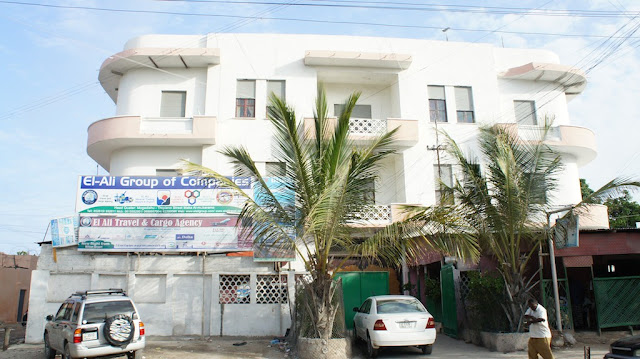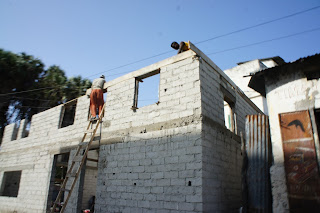After the War: Reconstructing Mogadishu
 |
| Rapid Development in Mogadishu, Somalia. Photo: Mitchell Sutika Sipus. 2012. |
Over the last 24 hours, the interwebs have been buzzing over an Al Jezeera Report about the disproportionate rise in property values in Mogadishu. Suddenly, after months of positive gains in Somalia, there is sudden panic that those who have suffered so long at the expense of war and poverty will again be abused by capitalism. Returnees and speculators are blamed for rapid inflation, making housing and property costs far from accessible for displaced and impoverished populations. This is a valid concern given that free markets typically facilitate the accumulation of capital faster than the distribution.
But this criticism is wrong. Inflation is not a problem in Mogadishu.
Certainly many are returning to invest and property prices are rapidly changing. This is necessary. The only way for Somalia to rebuild from 21 years of war is for outside investment to facilitate change and for the quality of life to improve, so does the price tag.
While Somalia does have some natural resources, its greatest asset is its location between the Middle East, South Asia, and all of Africa. It was founded because it was an important link for international trade, and in recent years Somali pirates were able to poach billions of dollars from international markets because they exploited this strategic location. With a geography founded on international trade, the recipe for Mogadishu to become a successful city and for Somalia to become a stable nation is to rebuild accordingly.
After the Transition
 |
| Rebuilding from the War. Photo: Sutika Sipus 2012. |
Within every post-war reconstruction process, rapid inflation occurs. The sudden influx of foreign money distorts local markets and in most cases creates a two-tiered economy. Typically, as in the case of Kabul Afghanistan or in Phnom Penh in the 90s, you will find a wealthy foreign class paying exorbitant prices, a rapidly growing class of wealthy business owners, and the bulk of the population stuck with low incomes, low prices for basic goods, high prices for real estate, and an increased ability to acquire luxury goods. When the wealthy foreigners leave the cities struggle to adjust, and in the best circumstance, distribution of capital becomes a little more even. This scenario is brutal as the intentions of reconstruction are only partly established and the process is economically painful to local populations. But Mogadishu has multiple advantages.
The Mogadishu Advantage
1. Lack of High-Level Foreign Interests
There is evidence that Mogadishu will not follow the typical same formula as other post-war cities. Foremost, the collapse of al-Shabaab is the consequence of many different phenomena some being military, but many also are economic and environmental. The concluding war in Somalia is not entirely due to outside actors.
Likewise the reconstruction process taking place has very little to do with outside actors. So far I have yet to encounter another westerner while walking down a street in Mogadishu, unless the person has returned from diaspora. I have met many people who work in Somalia with NGOs or foreign aid agencies, but compared to most global development hot-spots, there is barely a humanitarian/development presence in Somalia. In that same regard, there is funding from EU, Turkey, USA but the budgets are far smaller than for other countries, so at the political level there is limited foreign involvement.
2. Investment by Somali Returnees not foreign expats
 |
| Mogadishu at Work. Photo: Sutika Sipus 2012. |
At the local level, the situation is similar as outside investment is obtained primarily through individuals who have a committed personal interest in Somalia. These individuals will not disappear from the landscape with their pockets full of war profits, nor will their presence create a dual economy.
3. Reclamation is first issue among returnees
Many of those returning to Somalia are less interested in buying new property and are more interested in reclaiming the property they owned prior to the war. This becomes contentious with the massive quantities with internally displaced persons occupying many of the homes. There are no property records and the result is clogged courts over property ownership disputes, not rising costs of land. However I have been working with the Benadiir Regional Administration on this issue and have a feasible solution, it is just a matter of working with the proper ministries to implement the program. Notably, speed is a critical factor in this area.
4. Broad Multi-sector growth and regulation offset inflation
Inflation is only an issue if there is no access to employment or no means to regulate the growth so as to make the benefits accessible throughout the population. But this is not a problem in Mogadishu. While Al Jezeera argued that there is an "emerging economic divide" in the population and referred to a single estate at the cost of 8,000 USD per month to rent as evidence. the reporter had the situation backward.
Within a conflict, there is always rapid rise in prices for luxury housing, because there is so little of it. In the case of Mogadishu, there are were maybe 5 available properties like this among thousands of bombed out buildings, so 8,000 USD per month is actually a real deal!
Now that other housing options are emerging, supported by the construction boom (employment), luxury estates will cost less and populations will have more options. The widespread economic growth is evident in other sectors, such as the increase in internet access, and there are ongoing efforts to regulate growth, such as the developing initiative to register automobiles. In Mogadishu, rapid property adjustments is offset by widespread economic gains in employment and improved governance. As long as the rate of inflation is consistent with overall growth trends (assuming the distribution remains similar to now) an improved quality of life will be attainable to most the population in a matter of years.
Naturally there are other problems. Lack of maps, no land titles, no business registration, no functioning tax system. But these are on their way and will be implemented over time. Trust me, I'm working on it.
